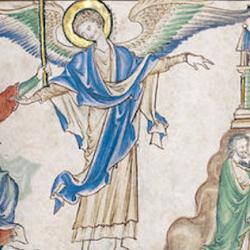After John introduces the new scene – “I saw another sign in the heaven, great and marvelous” – the sign is described with two clauses (Revelation 15:1).
The first is, woodenly translated, “angels seven having plagues seven the last”; and the second it “in them finished the passion of God.” In Greek, both clauses have seven words. The first contains the word “seven” two times, as well as the word eschatos, “last,” and the second clause has the word etelesthe, “finished.” In terms of word count and content, the verse is emphasizing that this sign of seven angels is the completion, the end of the wrath of God. The numerology indicates that it is a Sabbatical closure. A Sabbatical judgment is announced with two seven-word clauses.
-Not only the numerology, but the language points back to the original Sabbath day. Genesis 2:1 (LXX) begins with kai sunetelesthesan ho ouranos kai he ge, and 2:2 repeats the verb sunetelesen. This is not the identical verb to that in Revelation 15:1, but it is built on the same root teleo, a verb of completion.
Within John’s writings, this verb is most famously used in John 19, at the moment of Jesus’ death, when he cries out “It is finished” (19:30). That is the completion of a new-creation sequence, as Jesus goes to the cross as the Word made flesh to speak a new world into being.
The bowls bring an end to a creation process, though perhaps it is more accurate to say that it completes a decreation process. The bowls are the final sequence of seven in Revelation. By the end of the bowl sequence, the firmament has collapsed into a heap of huge hailstones, one hundred pounds each (16:21), and the city is split in pieces and remembered before God.
What is specifically stated is that the passion or wrath of God comes to completion. God’s wrath has been staged. Judgments have been intensifying. And now the Lord’s wrath is exhausted in a complete overthrow of the old world.














